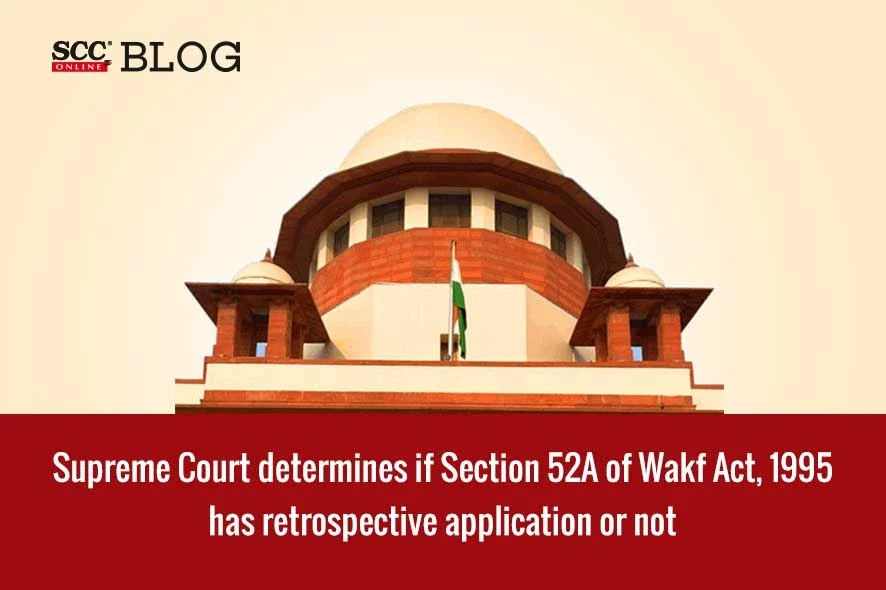Supreme Court: The Division Bench of S. Ravindra Bhat and Dipankar Datta, JJ., contemplated the retrospective/retroactive applicability of Section 52-A of the Wakf Act, 1995 in the present case. In the instant appeal the Supreme Court quashed the impugn order of the High Court of Kerala, and set aside the finding that the tenant was an encroacher, further the Supreme Court remitted the matter for fresh consideration, by the Wakf Tribunal.
Factual Matrix :
Two shops were leased to the appellants prior to enforcement of Wakf Act. Respondents alleged that P.M. Mammu Haji created a wakf in 1951. After his death, a suit was filed by his legal heirs to remove the trustee. The appellants noticed uncertainty on account of lack of clarity about ownership of the premises and filed an interpleader suit before the Munsiff court, Kozhikode. Subsequently the earlier court decreed the suit and directed the appellants to pay rent to the third defendant. CEO of the Board initiated several proceedings against the appellants for eviction.
Appellants preferred the suit and contended that the two, i.e., wakf and trust could not co-exist because a wakf creates a dedication in favour of God while a trust vests the property in the hands of the trustees.
During the pendency of the suit, the Wakf Act, 1995, was amended, with effect from 01.11.2013. Two new provisions were added. One was the definition of “encroacher” Section 3 (ee) and Section 52A which made encroachment a criminal offence.
Eventually a criminal complaint was filed before the Court of the Judicial Magistrate, First Class (“JMFC”) Kozhikode, alleging that the appellants were encroachers and seeking their prosecution under Section 52-A of the Wakf Act, 1955.
Decision and Analysis:
• Applicability of Section 52A of the Wakf Act, 1955
Whether amendment can be construed as operating retrospectively ?
It was the contention of the appellants the penal provisions cannot be applied with retrospective effect. It was the case of the appellants that the possession was acquired in 1916, much before the amendment in 2013. It was further contended that Parliament never intended that those who held properties under prior leases and arrangements, upon their expiry, were to be treated as “encroachers”. Also, provision which enables the Wakf Board to deal with encroachers, is Section 54 and no proceedings were taken out against the appellants, who were straightaway sought to be dealt with as encroachers and prosecuted.
On the contrary the respondent relied upon statement of objects and reasons of the amendment to the Wakf Act of 2013. Emphasis was placed on the rationale behind inclusion of Section 52A, that is to declare illegal holding and occupation of lands as criminal offence.
The Court on the said issue observed that here is no controversy that Section 52A is a penal provision. The Court while relying on T Barai v. Henry Ah Hoe, (1983) 1 SCC 177 opined that it is only retroactive criminal legislations prohibited under Article 20(1) of the Constitution. The Court further opined that injunction against punishing anyone for conduct which was not an offence when it was committed, by an enactment, which creates one, subsequently, with retrospective effect¸ is enacted in our Constitution as a Fundamental Right.
The Court noted that appellants were permitted to pay rents in the interpleader suit, they were holding the premise when the amendment came into force, an eviction suit was pending when the amendment came into force.
Hence, the question was whether termination of tenancy, resulted in appellants becoming encroachers after the amendment became effective ? The Court opined that, expiry of leases or arrangements, by efflux of time or their termination, in the past, cannot be construed to mean that appellants become ‘encroachers’. Also, the past tenant whose possession is disputed and eviction proceedings pending will fall under Section 3 (ee) of the Wakf Act.
• Issue of ‘Continuing offence’ under Section 472 CrPC
The respondents contended that in view of Section 472 of the Criminal Procedure Code, 1973, the continued possession of the appellants constituted a continuing offence. Regardless of previous occupation, once the penal provision became part of law, under the 2013 amendment, the appellants’ conduct stood exposed to the risk of criminal prosecution. Further contended such was not an instance of retrospective law but that the conduct (of continuing to occupy the premises after being asked to vacate) amounts to a continuing offence.
However appellants contended that their continued occupation and repeated yet unsuccessful attempts by the respondents to oust them from possession do not render their continuance in the premises any less lawful and that the amendment of 2013 cannot be construed as operating retrospectively.
The Court opined that, there is no allusion to “continuing offence” or any expression suggesting that such a term (mentioned in Section 472 CrPC) would be attracted to actions which commenced in the past, i.e., before the amendment of 2013 came into force.
The Court held that, giving effect to a penal statute so as to cover past acts is a proscribed action in law. Hence, it was stated that Section 52A cannot cover cases where leases of wakf properties had expired in the past and tenant/lessee was at time of amendment of 2013 was in physical possession.
Appeal allowed.
[P.V. Nidhish v. Kerala State Wakf Board, 2023 SCC OnLine SC 519, decided on 28-04-2023]
Judgment pronounced by: Justice S. Ravindra Bhat.
Advocates who appeared in this case :
For the Appellant: Senthil Jagadeesan, Advocate on Record, R. Basant, Senior Advocate, (Raghenth Basant Ms. Roopali Lakhotia, Ajay Krishna, Advocates);
For the Respondent: Sayid Marzook Bafaki, Nishe Rajen Shonker, Advocates on Record, (Haris Beeran, Mushtaq Salim, Azhar Asses, Ms. Anu K Joy, Alim Anvar, Advocates).







